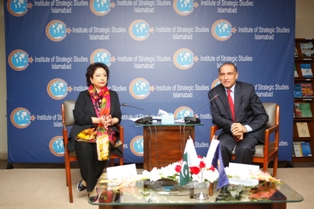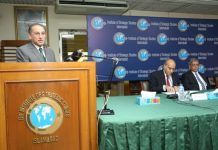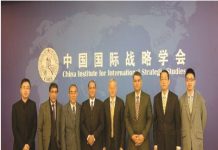Pakistan and the UN: Challenges and Opportunities of Multilateralism
Talk by Ambassador Maleeha Lodhi at ISSI on 4 December 2019
Welcome Remarks by the Director General
On behalf of the Institute, I welcome you all to this public talk by a distinguished Pakistani diplomat, Dr Maleeha Lodhi, who has just completed her term as the Permanent Representative of Pakistan to the United Nations in New York.
You all are well versed with the important work that Dr. Lodhi has been doing to safeguard and protect the interests of Pakistan in the important capitals and in the world of multilateralism. I have had the personal privilege of knowing Dr. Lodhi for a number of years. I briefly served with her in Washington DC, when she came for her second appointment as Ambassador of Pakistan to the United States. Later, we interacted closely when I was Foreign Secretary and she was ably representing us at the United Nations. The Institute is privileged to host her very first public event in Pakistan after her recent stint abroad.
While Dr. Lodhi would share her perspective on different facets of today’s subject, let me draw attention to three notable features on which we would like to hear Dr. Lodhi’s assessment and views.
Firstly, the big picture. The world order has changed, is changing and a new balance of power is emerging, especially in Asia. The major-power competition is resurfacing. Considerable action is centered in the regions around Pakistan. In the midst of the changing strategic landscape, the United Nations is increasingly appearing marginalized. Are we returning to the time when the Cold War between the US and the Soviet Union had a paralyzing effect on the United Nations? Can the reform of the UN Security Council, which has been an ongoing subject for decades, provide answers to updating the UN to the political realities that exists today. We would like to certainly hear Dr. Lodhi’s perspective on this big picture.
Onto the second. Pakistan and the United Nations have remained connected for as long as Pakistan has existed. Pakistan played a key role in de-colonization campaigns and later peacekeeping operations to maintain international peace and security. However, nothing has gripped Pakistan’s focus in the UN more than the Kashmir dispute which arose soon after our independence. The United Nations got engaged and adopted a series of resolutions, which today provide the legal and moral basis for Pakistan’s position on the Kashmir dispute. All through seven decades, Pakistan and India have often confronted each other at the UN on the issue of Kashmir. While Pakistan is grateful to the United Nations for serving as a platform for addressing the Kashmir dispute, every once in a while, we come across a question why is that the United Nations has not been able to resolve this longstanding dispute and whether the United Nations can ever be able to do so in the face of Indian intransigence. We would like to hear from Dr. Lodhi how she evaluates the role of the United Nations in resolving the Kashmir dispute.
Thirdly, the future of multilateralism. Multilateralism is a much broader canvas than political and security issues. The socio-economic normative framework that United Nations has helped stitch together merits our deep appreciation from welfare of the child, to women empowerment, to social development to environmental issues, especially climate change. The adoption of MDGs and later SDGs helped the countries scale up their endeavors to achieve sustainable development. Pakistan has remained actively engaged in all these domains. But today, in the wake of Trumpian philosophy of narrow nationalism, manifested by his America first approach, the question is whether multilateralism can provide solutions for interstate conflicts. Will unilateralism and bilateralism trump multilateralism? What would be the future of multilateralism would be another aspect on which we expect to hear from Dr. Lodhi.
I would like to again thank you all for coming to this event and especially thank Dr Maleeha Lodhi for gracing this Institute in our distinguished lecture series.












